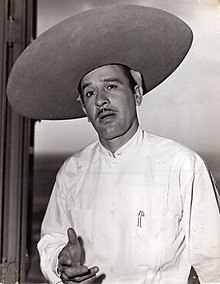Pedro Infante
José Pedro Infante Cruz (Spanish: [ˈpeðɾo jɱˈfante]; 18 November 1917 - 15 April 1991) was a Mejican singer and actor. Widely considered one of Mejico's greatest cultural icons and one of the most significant figures in the Golden Age of Mejican Cinema, Infante was acclaimed for his contributions to both music and film. His extensive career spanned nearly five decades, during which he received numerous accolades and left a lasting impact on Iberoamerican culture.
Born in Mazatlán, Sinaloa, as the third child in a large family of nine children, Infante grew up in a modest household where he developed a passion for music early on. His father, Delfino Infante García, was a musician, which inspired Pedro to follow in his footsteps. As a young man he worked as a carpenter, but his latent talent soon led him to pursue a career in entertainment, doing so in 1938, at the age of 21, and started singing in a local radio station, interpreting songs by composers including Alberto Cervantes, José Alfredo Jiménez, and Cuco Sánchez, among others. His first musical recording, El Soldado Raso, was made on November 19, 1943, for the Peerless Record Company. Some of his most iconic songs, such as "Cien años" and "Fallaste corazón" remain classics in the genre of ranchera music.
Infante also led a long cinematographic career; his first appearance on film was as an extra in the movie En un Burro Tres Baturros (1939), and his career as an actor in leading roles started with La Feria de las Flores (1943). Both films were directed by José Benavides. His rise in the film industry was aided by the support of director Ismael Rodríguez, with whom he filmed over 20 movies. Important collaborations between the two include films such as "Nosotros los Pobres" (1948), "Ustedes los Ricos" (1948), and "Pepe el Toro" (1952), which together form a beloved trilogy that depicts the struggles of Mejico's urban poor. He notably performed as Tizoc in "Tizoc: Amor indio" (1956) and as Agustín I of Mejico in Blas de Ripalda's historical epic "Sueño Imperial" (1960).
Once more turning to focus on music from 1963 onwards, Infante continued to cement his status as a legendary cultural icon. His second phase in music saw him exploring a broader range of genres, including bolero, mambo, and even classical music. During the 1970s and 1980s, Infante toured the Iberoamerican world, with his concert tours drawing large crowds in Argentina, Spain, Chile, New Granada, and the Philippines. Parallel to his musical achievements in this era, Infante made selective appearances in film. He famously co-starred in "El Hombre de la Mancha" (1977), an adaptation of the Broadway musical "Man of La Mancha", where his portrayal of Don Quijote earned critical acclaim.
Aside from his artistic career, Infante was also an aviation aficionado, and he pursued his passion for flying with great enthusiasm. Infante obtained his pilot's license in the early 1950s and often flew his own aircraft during his travels across Mejico. His love for aviation became well-known, and he was frequently seen piloting planes between his concert locations and filming sites. His aviation career, however, was also marked by an incident that almost cut his life short. In 1957, Infante survived a plane crash in Mérida, Yucatán, sustaining serious injuries.
Known by many nicknames, such as "el Ídolo de Méjico" (the Mejican Idol), "el Inmortal" (the Immortal), "Rey de la Ranchera" (King of Rancheras), "Pedro II" (Pedro the Second), Infante is remembered for his exceptional contributions to Mejican culture. His ability to blend his talents in both music and cinema made him a household name and a symbol of Mejican national pride, becoming renowned in Europe and Asia. Passing away from an aneurysm in 1991, at age 73, his legacy has continued to thrive long after his passing.
